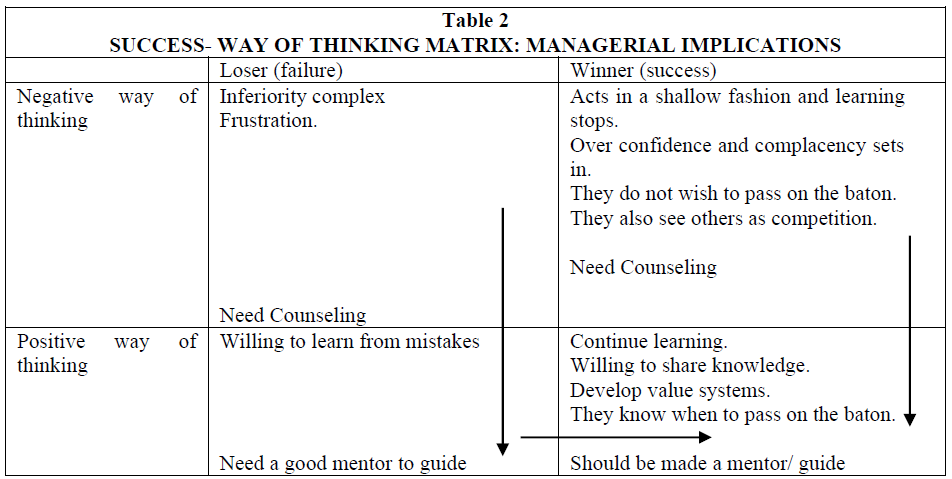Short communication: 2021 Vol: 13 Issue: 3
Good Losers Go On To Become Successful
Pingali Venugopal, Marketing, XLRI Jamshedpur
Abstract
Keywords
Bad winner, Good loser, Counseling.
Introduction
Are there born winners (Barraclough, 2021). I do not believe. Winners are made. Each one of us can be a winner and each one of us can make winners. We should facilitate in making winners (Hankins and Kleiner, 1995).
Life would have been better if there were only win-win situations. However, in today’s competitive situation it is all about a win-lose situation. The need to win gets ingrained into an individual’s nature. Right from childhood, people are taught to think that they should come first (or be successful). You keep hearing things like; nobody ever remembers who came second. You’re either on top, or you are useless.
Managing or help manage the win and lose (success/ failure) situations is very important in today’s competitive world. While winning or losing is one aspect, how the individual is taught to take a win or loss (success or failure) whether positively or negatively is also crucial. Combing the dimensions; outcome (win-lose) and the mindset (positive/ negative); the Success- Way of thinking matrix is developed Table 1.
| Table 1 Success - Way of Thinking Matrix | ||
| Loser (failure) | Winner (success) | |
| Negative way of thinking | Bad loser | Bad winner |
| Positive way of thinking | Good loser | Good winner |
If the person takes failure positively, then he/ she can be termed as a good loser. A good loser accepts that they have lost a game or contest without complaining. They analyze and learn from their mistakes. On the other hand, if the person takes failure negatively, then he/ she can be termed as a bad loser. Bad losers hate losing and they complain/ destroy. Again, a bad winner becomes arrogant and stops learning. A good winner on the other hand is willing to learn more and teach others.
Making a good winner depends on all of us. While one can congratulate a winner, we should appreciate and encourage the losers; they have a good potential to be made winners if properly guided/ encouraged.
Our guidance/ encouragement will impact the person’s way of thinking (facilitate learning). Learning has four dimensions. Learn to know, learn to do, learn to be and learn to be with others (UNESCO, 2015). Proper guidance should help a loser “learn to know and learn to do” (make the person a good loser) and a winner “learn to be and learn to be with others” (make the person a good winner). On the other hand, if we ridicule/ criticize a loser then we are killing their skills. Again, overpraising a winner would make the person “think highly of himself/ herself” making them complacent and stopping the scope for further improvement. Let us work towards improving the “way people think” about winning and losing.
Implications for Management professionals and Companies
Success or failure is common for managers. The way management professionals move in the Success-Way of Thinking Matrix with the support of their companies is not only critical for the long-term career of an individual but also equally important for the growth of the organization.
Failure with a negative of way of thinking would lead to inferiority complex (The Hague Psychologist, 2016) and frustration. The company should counsel such people and convert them as good loser.
A good loser (having positive way of thinking) would be willing to learn from mistakes (Lim, 2021). The company should attach them to a good mentor. The mentor should help them to become a good winner.
A good winner would continue to learn and would be willing to share his/ her knowledge with others. More importantly, they would know when to pass on the baton (delegate) to the next person. The company should then make them a mentor or guide for others.
Bad winners stop learning and become complacent. Bad winners not only fail to pass on the baton to the subordinates at the right time, worse still they may consider others as a threat to their position. The company should ensure that they are no bad winners. The company needs to identify such people and counsel them and make them good winners. The managerial implications are summarized in Table 2.

The success is how the organization is building the culture of appreciating failures and help learning to make losers successful managers.
References
- Barraclough, J. (2021), “Are Winners Born or Made”, https://believeperform.com/are-winners-born-ormade/ accessed May 25, 2021.
- Hankins, C. & Kleiner, B.H. (1995), "New developments in supervisor training", Industrial and Commercial Training, (27): 26-32.
- Lim, C. (2021), “This is why you should be proud of making mistakes,” https://www.lifehack.org/299971/this-why-you-should-proud-making-mistakes, accessed May 24, 2021.
- The Hague Psychologist (2016), “What are the causes of Inferiority Complex”, https://www.google.com/search?q=negative+of+way+of+thinking+would+lead+to+inferiority+com plex&oq=negative+of+way+of+thinking+would+lead+to+inferiority+complex&aqs=chrome.0.69i5 9.2849981j0j9&sourceid=chrome&ie=UTF-8, accessed May, 25, 2021.
- UNESCO (2015) Rethinking Education. Towards a Global Common Good, UNESCO, France.